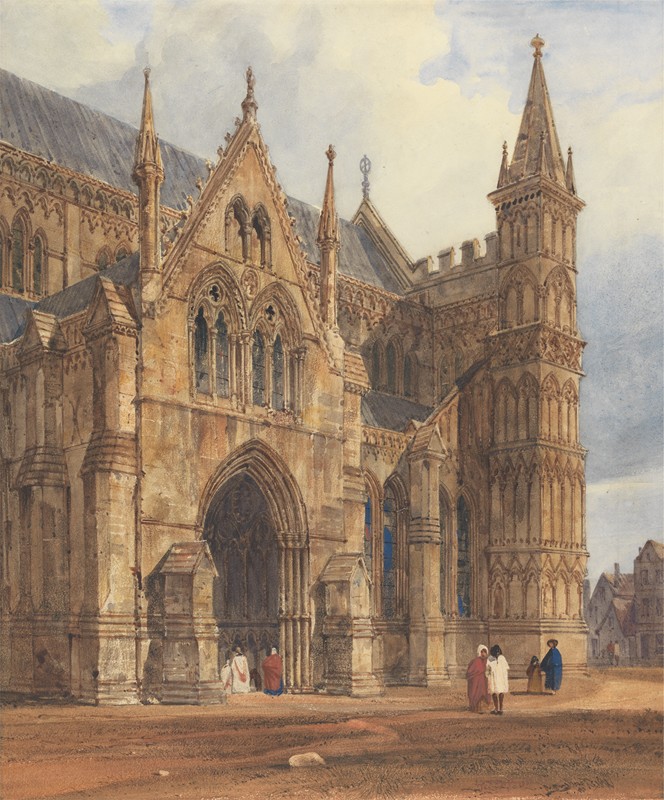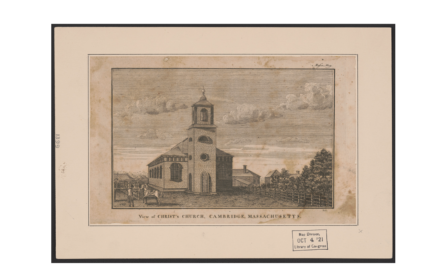Clive Staples Lewis was one of the most important writers of the twentieth century. He is perhaps most famous for his Chronicles of Narnia and Space Trilogy series, though also highly respected as an essayist and theologian. An Oxford scholar and literature professor, he was widely respected as a public intellectual, and his writings on Christianity are considered the most influential of the past century. Professor Jason M. Baxter is the author of The Medieval Mind: How Great Books Shaped a Great Mind, in which Baxter aims to add another title to Lewis’ already formidable reputation; Lewis as a medievalist. In addition to the wonderful world of Narnia, and the satire of Screwtape, Baxter argues, Lewis was also a deeply knowledgeable Medieval scholar, and it was his love and knowledge of this particular era which drove his writing.
Central to Baxter’s argument is the concept of “atmosphere” present throughout Lewis’ life and writing. The atmosphere of a book involves the time and place, the “rules” governing that setting, tone, and word choices. Atmosphere is often only spoken about in regards to fiction titles. This is short-sighted, however. While atmosphere certainly plays a part in the setting and world-building of a story, atmosphere is also present in non-fiction, particularly in books written at a different time. Atmosphere in non-fiction is composed of conventions, gathered from the “common sense” of an era, and the things “everyone knows.” It’s the customs and beliefs taken for granted by the people of the day; the aspects of life invisible to the contemporary reader, yet curious, backwards, or otherwise surprising to someone in a different era.
Quoting Lewis, Baxter writes, “It is this weather or native habitat that makes literature of the past so precious, because it allows for an opportunity to recover ‘what it all felt like from within’ or ‘what the ritual meant to those who enacted it. The literary scholar has access not just to ancient ideas but to ancient feelings …‘”
These customary beliefs, particularly of the Middle Ages, fascinated Lewis. The scholar, in Baxter’s description, kept the notion of moving within that atmosphere central to his thinking and as a goal in his writing, both fiction and non-fiction. Lewis endeavored to infuse his own writing with the atmospheric hallmarks of Medieval literature, bringing to life the realities of that world in modern language. Here is how Baxter describes the reading and historical descriptions which animated Lewis’ imagination. “As the planets rotate, they play a kind of intellectual music, to which we earthlings have become deaf, but we can regain the ability to hear this music through study or through beautiful music, which imitates the same harmonic proportions. This idea of a musical universe – whose planets are spaced out like strings on a musical instrument – delighted the imaginations of medieval thinkers.“
Though Lewis lived into the mid-twentieth century, his sensibilities were more in keeping with his beloved Medieval scribes than our current times – a fact he was well aware of, referring to himself as ‘the last dinosaur’. Lewis understood that technology fundamentally changes one’s relationship with the world, and our perceptions of reality. He was disturbed by technologies new to the early twentieth century, and made no attempts to hide his distaste for certain modern conveniences. As he saw it, the ability to cover hundreds of miles in a train or car destroyed one’s grasp of time and space, and worked to dispel the mysterious in the world we inhabit. The person who travels hundreds of miles in an afternoon has no context for the lands through which he has passed. As illustrated by today’s derisive term “flyover country” in the States, farms and towns fade into scenery on the way to somewhere else. Technology enables and even hastens such social divides.
“Every age has its own outlook. It is specially good at seeing certain truths, and specially liable to make certain mistakes. We all, therefore, need the books that will correct our characteristic mistakes of our own period. And that means the old books.”
– C.S. Lewis, “On the Reading of Old Books”
The Middle Ages were a time when people encountered the supernatural and the mysterious on a daily basis. Today, we tend to look back on this era as primitive and rife with superstition. Lewis, though, found this inaccurate, demonstrates why. People during the Middle Ages understood there were causes and effects, hence their practices to ward off disease and concerns about air quality. Further, they understood celestial bodies were suspended in orbits. They understood disease had a cause, and quarantined the ill. As Lewis writes, and Baxter illuminates, people living in the Medieval era maintained sophisticated systems; take, for example, the architecture of Salisbury Cathedral or Thomas Aquinas’ Summa. These were craftsmen and scholars; not dull minds stumbling in spiritual stupor, blindly attributing everything around them to magic and warlocks. While they weren’t afforded the extent of knowledge we possess today through powerful microscopes and telescopes, they did understand they lived in world ordered by predictable and near-constant laws, the same world which we have inherited.
Lewis reminds us that it is we who have discarded the image of the supernatural or spiritual, while the mysteries underpinning reality have neither left us nor been solved. He saw this to be true in his own time, and attempted to reveal those ideas through his writing, aiming to bring that Medieval sense of profundity to modern readers. Where the Medieval reader was familiar with quoting Scripture, as well as classic stories from antiquity, today Americans generally are not well versed in classic literature and familiarity with religious scripture has become rare. Whereas spirituality was a fact of life, abundantly referenced in paintings, sculptures, literature, and the law during this time, today spirituality is viewed, at best, as an eccentric personality trait. Without a basic understanding of myths and scripture, one has no context for Michelangelo’s “David”, Da Vinci’s “The Last Supper”; Hobbes, Rousseau, Nietzsche, or virtually any text written prior to 1940 .
Religion, in general terms, has played a key role in law, education, and social custom, from society’s first steps. Today’s atmosphere is novel with respect to the hostility directed at religion in general. This represents a departure from most of human history. The average Westerner is far removed from church-going and all but totally ignorant of the origins of Western society. Most can’t even speak knowledgeably in generalities regarding churches, scripture, etc. In a recent popular video on habits of medieval royalty, the narrator remarked that Charles I of Spain’s custom of speaking with a priest each morning, then attending mass was essentially “double dipping” and redundant. This comment betrays a scant understanding of the central role religion has held throughout history, and appears particularly ignorant of the importance of spiritual concerns up until the Enlightenment in the 1700s. These concepts have been critical in shaping public and private life for centuries, yet today only a minority are familiar with them. A lack of understanding such key aspects of human history creates a dearth of shared common knowledge across culture in general, and this, as we’ve seen, is only hastened by technology.
Atmospheres and common knowledge can change quickly. For centuries, war efforts depended on horses. There was no calvary without horses; location scouting and intelligence gathering often required the transportation horses provided. Runners needed to move quickly from camp to camp to deliver messages, and horseback was obviously superior to trudging along on foot. Horses were a routine fact of warfare, until trench warfare was established during World War I. As Britain prepared troops and old equipment during the Great War, the military ran through drills for firing canons. The drill required five men; three seconds before the canons fired, two men stood at attention off to the side. No one could figure out what purpose this served; it looked like useless movement. They brought in a Boer War veteran to observe the drill. “I’ve got it,” he said after a moment. “They’re holding the horses.” The drill required two men to hold the horses secure so when the canon fired, they didn’t run off or harm themselves or anyone else. Hence the saying, “Hold your horses.” The world in which that saying emerged was different from today, but our world still retains traces of that atmosphere.
These sorts of details hidden between the lines of yesterday’s writing, when explored, expand our understanding of civilization and those who built it. Knowing the facts is a worthy endeavor; understanding the times in which those facts occurred and were recorded adds multiple layers of understanding to rote facts. It is the atmosphere of an era which compels us to spend time with a certain period of history, or within a given area of history.
Along with the collapse of our appreciation of time and space, our tendency to reduce the world (and often people) around us to mere data points or labels precludes any sense of wonder or “godly fear,” as the Middle Ages would recognize it. One consequence of our unmitigated embrace of technology has been an erosion of respect for anything which cannot be quantified. Data and science are helpful tools; neither data nor science are the end of all things. While we are just beginning to reckon with concerns of artificial intelligence replacing artists, and creating passably generic essays, the Medieval world had a clear, if narrow, understanding of what makes a human human.
Ultimately, Lewis believed we had abandoned the concept of Man for a humanized machine. We continue to dream of shedding our “inefficient” human tendencies in a Quixotic quest to become the superior, efficient machines we imagine will be more accomplished and less unhappy. It’s no coincidence that those hastening the arrival of our robot overlords are the same folks who consider religion and metaphysics a blight on the world. Much better to be a machine, they say, than a man. Much better to dismiss the unknowable, than to gaze upon it. After all, “What man has joined, nature is powerless to asunder,” or so they’d like to believe. Yes, men, humans, are fallible and illogical; they require rest and replenishment, are prone to emotion, and tend to consider the well-being of those around them. Humans are wildly inefficient if your goal is to produce mechanical and easily measured results on a conveyor belt called life. Technologists will always attempt to tame the unknowable. And yet, so long as humanity embraces this mysterious, creative side – in part by preserving the atmospheres and wisdom of the past- we will continue to protect the very things which make us human.
Image: Thomas Shotter Boys, “The North-West Porch of Salisbury Cathedral”. 1832. English, 1803-1874.
Select Bibliography:
The Medieval Mind of C.S. Lewis by Jason M. Baxter
On the Reading of Old Books by C.S. Lewis
Brave New World, by Aldous Huxley
“What Americans Know about Religion” from Pew Research




